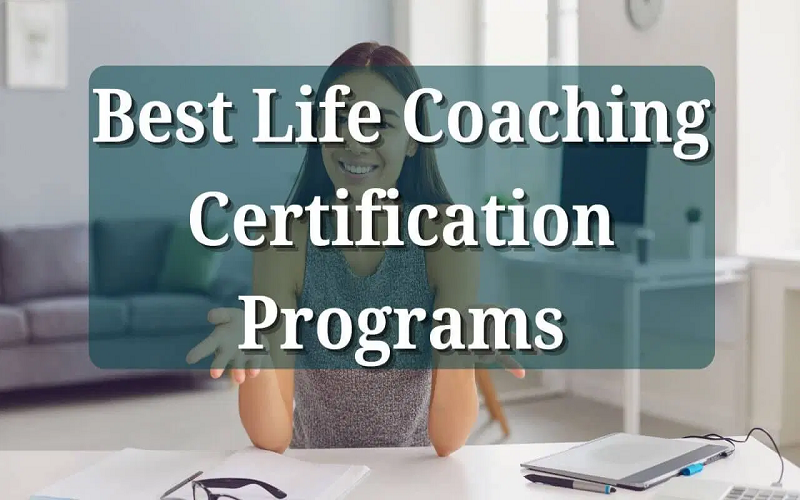
Life coaching has become an increasingly popular employment route for those who want to assist others improve their lives. To operate as a professional life coach, you must first receive formal accreditation from a reputed institution. Let us look at some of the major qualities that distinguish the best life coach certification programs.
Curriculum
Any coaching certification program’s curriculum should provide a firm foundation in basic coaching competencies and skills. Look for programs that address subjects such as coaching models and frameworks, communication skills, ethics, assessment methods, and more. Reputable programs ensure that their curricula are based on the International Coaching Federation’s key competencies. They also update their materials and lessons with the most recent research and breakthroughs in the sector.
Hands-on Training
While theoretical knowledge is crucial, the ability to use coaching skills in real-world situations is critical. Top programs provide hands-on training opportunities like supervised practice sessions, fake client sessions, and observation hours. It allows students to get more comfortable with coaching sessions and receive feedback on their strengths and areas for improvement from experienced mentors. Some organizations even arrange for trainees to work on pro bono cases during their certification training.
Faculty Qualifications:
The background and qualifications of faculty members indicate the overall quality of a coaching certification program. Look for programs in which the bulk of the teachers are fully trained coaches with extensive coaching experience. They should also have coaching-specific certifications, such as advanced degrees in psychology, counseling, or education. Highly qualified teachers can better share practical wisdom from their own coaching experiences.
Post-certification support
Even after they have completed their certification training, life coaches require continual growth to improve their skills. The best schools offer post-certification support via alumni networks, continuing education workshops, and resources such as reference materials. They also contribute to the credentialing process by supporting graduates with applications to organizations such as the ICF. Having a program’s support even after certification prepares coaches for long-term success.
Program Accreditation and Credentials
It’s critical to ensure that the coaching certification program to choose is fully accredited. Look for programs that are approved by the ICF or other reputable accrediting bodies. It guarantees that the curriculum and standards adhere to industry-wide best practices. Consider programs where obtaining their certification leads to highly recognized coaching qualifications, such as the ICF ACC. Credentials that are well-regarded lead to greater professional options.
Cost and Financing Options
The expense of a coaching certification program should also be considered. Premium programs can cost anything from a few thousand depending on criteria such as program length and delivery format. However, several provide payment plans and scholarships to make coaching education more cheap and accessible to dedicated students. It’s also important to investigate external financial sources such as student loans. When selecting a certification, consider value rather than exact cost.
Student and Graduate Support
Interact with current and former students as much as possible to gain insight into the true student experience of a program. Does the program’s director and staff reply promptly? Are student reviews online excessively positive? Reputable programs also offer career coaching services such as résumé evaluation, sample interviews, and job placement support. They seek to prepare graduates for success beyond certification. Top coaching education companies pride themselves on providing exceptional student care.
Rigorous Evaluation Process
The best coaching certification programs use rigorous evaluation systems for students. It includes assessing coaching abilities and knowledge using methods such as recorded mock sessions, written tests, and competence interviews. The purpose is to ensure that every graduate has mastered the fundamental competencies before using the credential. Programs may also require a certain amount of supervised client hours following certification. Students and future clients can have faith in the program’s standards after a rigorous review.
Industry Recognition
Does the program have a good reputation with hiring managers and professional coaching organizations? Consider how long they’ve been in business and whether they’re well-known in the coaching community at large. Accreditations, graduate success stories, industry honors, and rankings can all help you determine the prominence of a program. Overall recognition indicates that a credential will have value with potential employers and clients.
Reputation for job preparation
The ultimate purpose of coaching certification is to prepare graduates to work as professional life coaches. As a result, it’s critical to select a program with a proven track record of career assistance that leaves graduates feeling secure and job-ready. Expect strong graduate employment rates, particularly within 6-12 months of certification. Traits like these indicate that a program’s training will provide you with a competitive advantage in the present coaching market.
Program Reputation and Alumni Network
A coaching certification program’s reputation and alumni success can speak volumes about the training’s effectiveness. Seek out programs with a long history and a good reputation in the coaching world. It demonstrates that the training is tested and true.
Additionally, a robust alumni network allows current and prospective students to learn from experienced coaches. Some programs support active alumni associations or online communities. These enable students to communicate directly with alumni working in the subject. Following certification, the networks may offer informal mentoring, job recommendations, and continuing education possibilities. An engaged alumni base reflects the program’s dedication to lifelong learning and career development.
Delivery and Schedule Flexibility
Given that most people pursue coaching certification while working, search for programs that accommodate a variety of schedules and lifestyles. Flexibility can be achieved through completely online, entirely in-person, or blended modes. Some even offer part-time and expedited programs lasting 6-12 months.
Ideally, programs allow students to advance at their rate within a maximum time frame. It is more appropriate for working professionals than fixed start and end dates. Additional features, such as asynchronous learning modules, pre-recorded life coaching courses, and one-on-one coaching, increase flexibility. Coaching instruction should complement, rather than interrupt, your daily life. Programs that accommodate students’ demands through flexible delivery are the most enticing.
Conclusion
Consider these essential elements when choosing a life coaching certification school that will give you the greatest education and prepare you for success as a professional coach. Choosing an accredited school with experienced professors, hands-on training, post-certification assistance, and a solid reputation will help you start your coaching career on the correct track.

